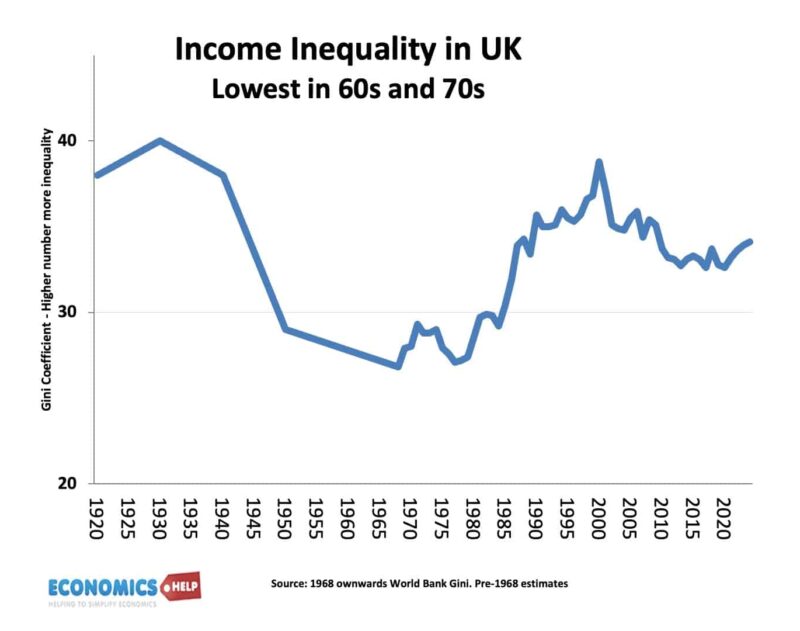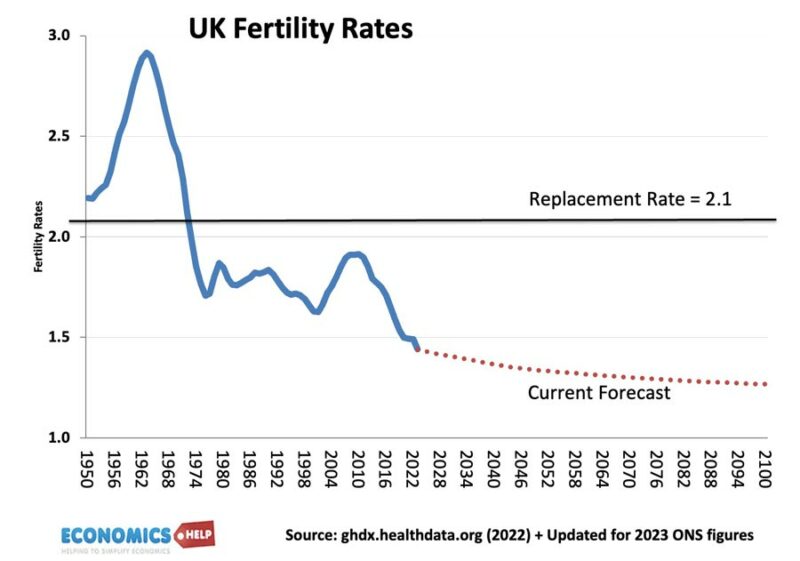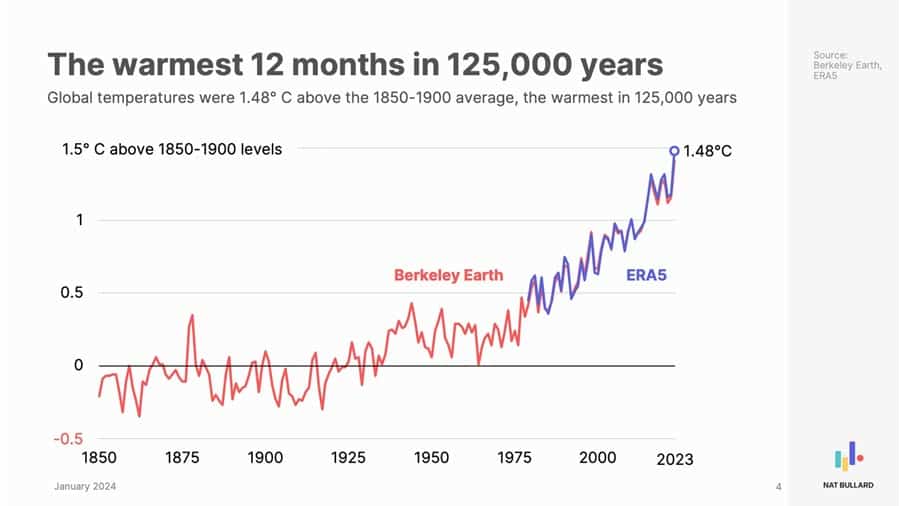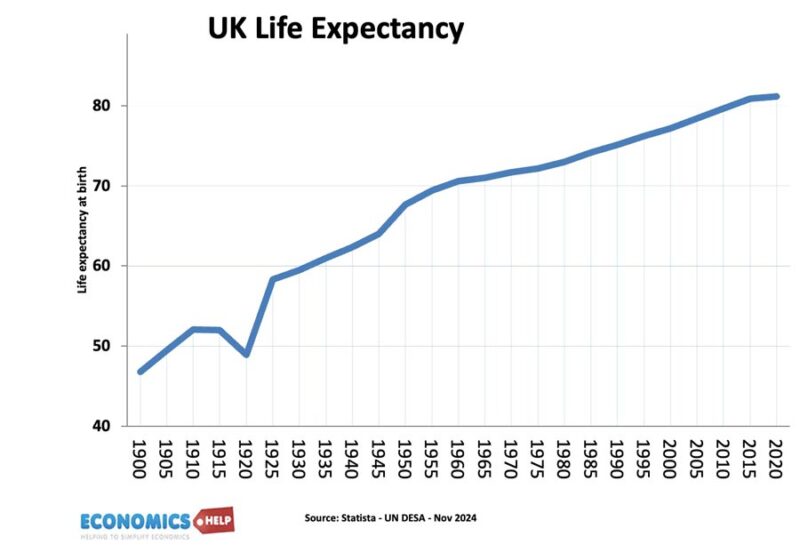Double-digit inflation, youth unemployment soaring, and a general sense of the UK’s economic decline. Is there any hope for the younger generation? Now here I’m not actually talking about 2025, that was the 1970s and early 1980s. It’s never been easy to be young, but whilst the Covid generation may not have the unemployment rates of the 1980s, there is widespread pessimism, with 60% of young people fearful of what the future will bring. There are immediate challenges – Unaffordable housing, poorly paid jobs, expensive education, and declining mental health. And then there are all the long-term challenges – an ageing population, rising government debt, greater inequality, the pressures of social media, and damage to the environment which will affect them more than the generation currently in power. In a poll, 80% of my viewers reckon life will be worse for the young generation, only 9% think it will get better. But, are things really so bad? away from the doom scrolling of the internet, could some aspects of life not could get become better in the future?
Declining Mental Health
Since 2009, the Prince’s Trust report that young people face worsening outcomes in all areas of life, but especially emotional health, with reported scores falling from 73 to 65. 40% report experiencing a mental health problem, and 43% feel anxious on a daily basis about the cost of living. Despite spending several hours a day online, 50% of young people would prefer a world without the internet? Social media companies have invested billions to trigger every negative emotion and compulsion of the human brain to attract attention and keep you online. The fear of missing out, makes it hard to turn off and disconnect. Every young generation has gone through difficult times, but now the mistakes and over-exuberance of youth are now permanently online. Another aspect of social media, is that algorithms reward quite strongly negative news, the worst aspects. That was always there, it’s not like the newspapers of the past were brimming full of hope and optimism. But, the difference is that you didn’t doomscroll the daily newspaper. You read it at breakfast and threw it in the bin. With an online world, we are never far away from the next ping, the next news article, the next youtube video telling you how bad the UK economy is doing. Guilty as charged.
Economic Challenges
But, it’s not just perceptions of difficult times, the younger generation do face very real economic challenges. The UK economy really is doing badly. The 70s, was an era of strikes, power cuts and rampant inflation, but at least real wages were rising, and housing was affordable. In the 1970s, median house prices to incomes were around four times. But, in the past few decades, this income multiple has doubled closer to eight times income. It means many young people despair at the prospect of being able to buy a house. In other countries, there isn’t the same desire to buy, but the only alternative renting is also really expensive, and many fear spending a lifetime in the rented sector, with rents constantly rising. When average rents are £1,300 a month, it’s very difficult to save for a deposit.
Expensive Education
Another big difference with the 1970s is that university education has become very expensive; there was a time when a degree would definitely help get a good job. But, with more graduating, the graduate wage premium has declined, with average starting salaries not much more than the national minimum wage, which begs the question: is the 3 year university course really worth a delayed working life and an average £50,000 student debt. On the one hand, many more young people have the opportunity to go to univeristy. Even with diminishing financial benefit, it is still an important cultural and educational opportunity that was not widely available in the past. It would be a mistake to reduce everything to salary. But, at the same time, many young people leave university with degree, debt and low paying jobs ,asking themselves was it really worth it.
Inequality

In the post-war period, inequality declined as growth was broadly felt, but since 1979, inequality has once again increased, mainly in terms of wealth. The Baby boomer generation which bought housing when it was cheap, are now set to pass on £7 trillion by 2035, £200bn a year. It means the financial security of future younger generations will be more dependent on whether parents are able to pass on wealth. It will create a deep sense of unfairness that we no longer have equality of opportunity. In one sense you could argue we are much better off than say 1945; real GDP per capita has increased, and the amount of consumer goods has increased, but it counts for little, when you feel relatively squeezed, especially on the fundamental issue of housing and health care.
Fertility Rates

Across the world fertility rates are falling. People are reluctant to have children when the cost of living does not support large families. The collapse in birth rates is leading to a rapidly ageing population. The share of the population over 65 is set to soar, meaning that our current pay-as-you-go state pension system will face increasing pressures, with the young generation needing to pay a higher share of tax to pay for health and pensions of an ageing society. This shows the net fiscal impact by age. We need young adults to subsidise education, health care and pensions. It is no wonder debt levels are set to rise, and the burden will be on future taxpayers to meet the rising cost of debt interest payments.
The young will also have an increased unofficial care burden role. Although life expectancy has increased, healthy life expectancy hasn’t. There has been a rise in conditions like dementia and motor neurone disease which place a great burden to look after. If the government wants to stop care worker visas, who is going to look after your parents?
Global Warming

Global weather systems are undergoing radical change, with growth in average temperatures and an increased risk of extreme weather events. A greater share of Gen Z and millennials say climate change should be a top priority to ensure a sustainable planet. This share is smaller for the older generation who will not be affected by the costs of future global warming and climate change. Young people also feel many decisions like EU, housing, the environment are mostly been taken by an older generation who will not be around to see the full effect.
AI
Another challenge is that AI is transforming the labour market. Many current jobs will be automated and replaced by AI. Even creative industries like writing and teaching could fade away. New technology may boost the profits of some multinationals, but risks taking away good jobs which have a creative, rewarding component. The brave new world of AI and digitalisation also risks a world lacking in human contact, personal interaction which is critical to feelings of well-being. Self-checkout tills, working from home, Zoom meetings, the AI revolution is boosting productivity by keeping us chained to a computer; no wonder, there is a growing sense of isolation.
Brighter Side of Life
You could go on listing potential problems of the future, but when it comes to the future, it would be a mistake to feel completely beholden to economics. Yes, living costs are high, and job prospects limited, but there was never a golden era of affluence. It is said the greatest levels of national unity feeling of togetherness occurred during the second world war, when we were restricted to rations, blackouts and real sacrifice. Though, by far the greatest boon for any generation would not having to take part in wars. The post-war period saw a peace dividend with falling defence spending enabling higher health care, but new threats, are putting pressure on more defence spending once again.
Live Longer

Whilst some things have gone backwards like housing affordability, the broad sweep of history is still on an upward trajectory. Just 120 years ago, life expectancy was 40, today it is double. True, new health conditions have emerged, but if we successfully eliminated many fatal diseases like smallpox, cholera and TB, there is no reason why medical science cannot find new solutions to dealing with the modern health problems. Obesity has soared since the war, causing many health conditions, largely driven by ultra-processed foods from multinationals. But new weight loss drugs and a backlash against junk food suggest we may have reached peak-obesity and this will reduce some of the health problems.
People have always worried about technology taking their jobs. Is AI different? AI can automate boring aspects of jobs, leaving you more time to do the creative aspect of the job. It may help deal with issues like caring for an elderly population. Also, whilst climate change and pollution is a real problem, it is easy to forget how much progress has been made in renewable energy. Solar power has become much cheaper and better. Battery technology has been improving at an exponential rate. Some may argue the UK national grids can’t properly deal with solar, which is partly true. But, the rate of improvement in battery storage and also new forms of energy, mean the long-term future will be bright in terms of cheap, renewable energy.
Even surveys and reported levels of crime have seen a very significant 80% fall since the mid 1990s, though with prisons full to overflowing, the public remain sceptical of this trend.
Fears don’t always materialise
In the nineteenth century, the economist Thomas Malthus prophesised over-population would cause mass starvation, in the post-war period, there was a renewed fear of over-population, now we worry about running out of young people. From the 1940s to the mid-70s there were fears of global cooling. In the 80s, there was very real fear of nuclear confrontation. The point is some of our worst fears don’t materialise. In the long-term, there is a potential for housing to become cheaper, energy to become cheaper, and for technology to help humans create a better world.
I was born in 1976, would I prefer to be born post 2000, no I wouldn’t. I really appreciate not having the internet until I was 18 years old. I think it was a pretty good time to be born. There are very real challenges for young person, but to an extent it depends what you make of it. H
Sources
- www.kingstrust.org.uk/about-us/news-views/princestrustnatwestyouthindex2024
- www.pewresearch.org/short-reads/2021/05/26/key-findings-how-americans-attitudes-about-climate-change-differ-by-generation-party-and-other-factors/
- www.newscientist.com/article/mg19225822-300-the-ice-age-that-never-was/
